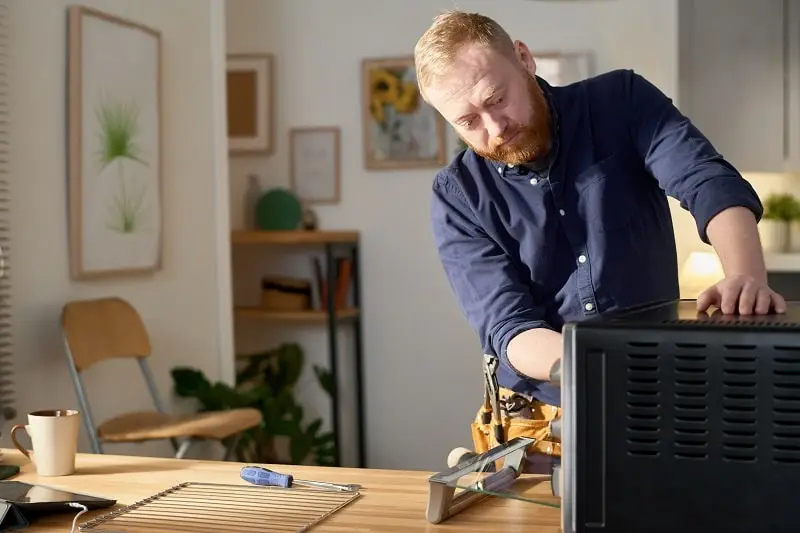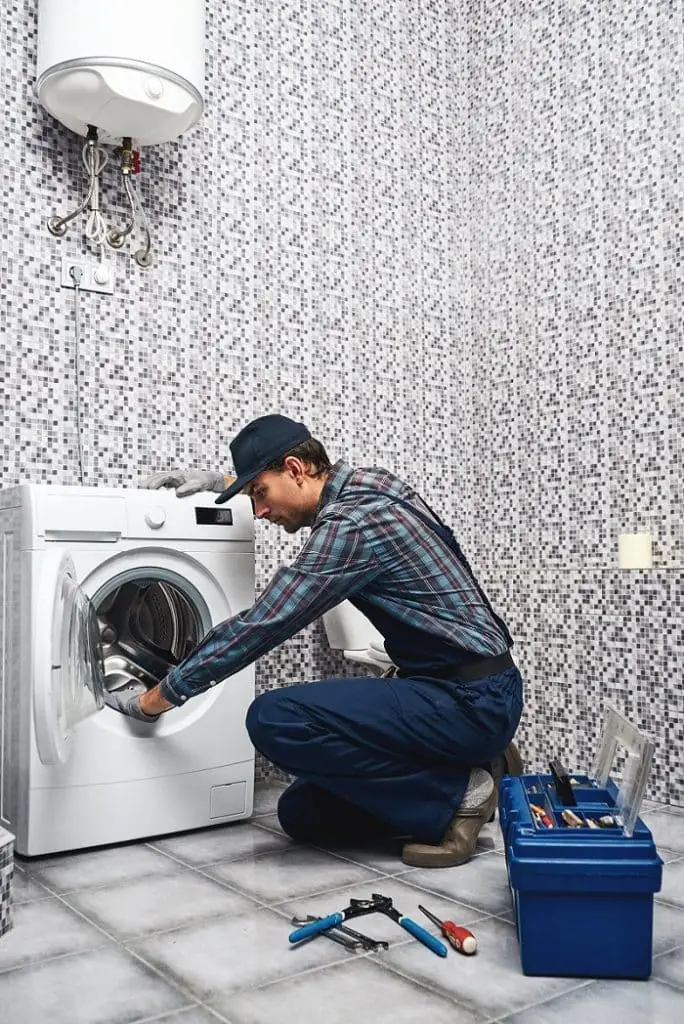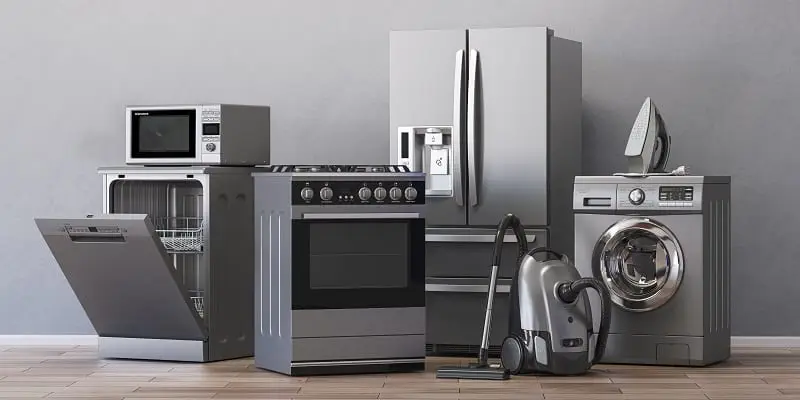Are you tired of spending a fortune on appliance repairs? If so, it’s time to consider the DIY route. In this blog, we will provide you with expert recommendations for successfully repairing your appliances at home. We will cover everything from understanding the basics of appliance repair to assessing your own skills and knowing when to seek professional help. You will also learn about the importance of warranty evaluations, identifying maintenance tasks, evaluating costs, and avoiding common mistakes. Additionally, we will guide you through the necessary tools and materials, emphasize safety precautions, and stress the significance of understanding the owner’s manual. Get ready to save money and become a pro at DIY appliance repair!

Understanding DIY Appliance Repair
Assess the issue, research online resources, and follow safety precautions when attempting DIY appliance repair. Gather the right tools and start with simple repairs to gain confidence. It’s crucial to carefully read instructions and watch tutorials for a step-by-step process.
Importance of Knowing Your Appliance Well
Knowing your appliance well allows for more effective troubleshooting when issues arise. Understanding the components of your appliance helps identify the source of the problem. Knowledge of the model and brand aids in finding specific repair guides or tutorials. Familiarity with the warranty and user manual provides valuable repair information. A good understanding helps determine when professional help is necessary.
Key Factors to Consider Before Starting a DIY Repair
Assess your skills and capabilities before attempting a DIY appliance repair. Research and gather the necessary tools and replacement parts. Follow manufacturer’s instructions and safety guidelines carefully. Start with simple repairs before tackling complex ones. Consider consulting online tutorials or seeking advice from experts if needed. Be prepared to troubleshoot and problem-solve during the repair process.
Are You Familiar with the Age and Model of Your Appliance?
Knowing the age and model of your appliance is crucial before attempting DIY repairs. This information helps determine if parts are available and if repairing is worth it. Check the label or user manual for this data, or contact the manufacturer for assistance.
Importance of Warranty Evaluations in DIY Repair
Understanding the warranty terms and conditions is crucial before attempting any DIY appliance repair. Evaluating the warranty coverage can help determine if the repair should be done by a professional or if it is safe to do it yourself. Conducting proper research and consulting with experts can help ensure that DIY repairs are done correctly and do not void the warranty. Following manufacturer instructions and using authorized parts can help maintain the warranty and ensure successful DIY appliance repair.
How to Determine if Your Appliance is Still Under Warranty?
To determine if your appliance is still under warranty, there are a few steps you can take. First, check the warranty documentation that came with your appliance. Look for any warranty stickers or labels on the appliance itself. If you’re still unsure, contact the manufacturer or check their website for information on warranty coverage. And if all else fails, it’s always a good idea to consult a professional repair technician.
Identifying DIY Maintenance Tasks and Those to Avoid
When it comes to DIY appliance repair, there are certain maintenance tasks that you can safely handle at home. This includes simple activities like cleaning filters and checking for loose connections. However, there are tasks that should always be left to professionals, especially when it involves repairing electrical components or replacing complex parts. It’s important to understand the warranty of your appliance and the potential consequences of attempting DIY repairs. To ensure success, it’s recommended to find reliable repair guides or tutorials for common appliance issues. And of course, don’t forget about safety precautions such as unplugging appliances and using protective gear.
Recognizing Simple Checks and Fixes in DIY Appliance Repair
Simple checks like inspecting the power supply and cleaning filters can often resolve common appliance issues. DIY fixes, such as replacing worn-out gaskets or unclogging drain pipes, can save time and money. For complex repairs involving electrical components or gas lines, it’s best to consult a professional to ensure safety and proper diagnosis. Always refer to appliance manuals or online tutorials for guidance. Prioritize safety and make informed decisions to extend the lifespan of your appliances.
Evaluating Costs: Is DIY Repair Worth It?
Considering the cost of parts and tools, comparing it to hiring a professional, and assessing your own skills are crucial when evaluating if DIY appliance repair is worth it. Additionally, it’s important to consider the potential risks and consequences of making mistakes during the process.
Is it cheaper to repair or replace your appliance?
Considering the specific appliance and extent of repair needed, the cost-effectiveness of repairing versus replacing may vary. In some cases, repairing can be more affordable. However, if repair costs are close to or exceed the price of a new appliance, replacement could be a better option. Consider factors like age and condition when deciding.
Assessing Your Own Skills: Are You Cut Out for DIY Repair?
Assessing your abilities is crucial before embarking on a DIY appliance repair project. Consider your comfort level with tools and working with electrical or mechanical components. Evaluate your knowledge of the specific appliance and determine if the repair requires specialized skills. Be realistic about your time, patience, and problem-solving abilities.
Knowing When to Seek Professional Help
Not all appliance repairs are suitable for DIY. Specialized tools or knowledge may be required, and it’s important to recognize your limits. Complex repairs without proper training can cause more harm or safety hazards. Hiring a professional ensures correct work, preventing future issues or costly mistakes. Consulting a professional when in doubt can help assess the problem and determine the best course of action.
The Role of Professional Assistance in Appliance Repair
Knowing when to attempt a DIY appliance repair and when to seek professional help is crucial. DIY repairs can be risky and potentially dangerous, especially when dealing with complex issues like electrical or mechanical components. Hiring a professional appliance repair service offers numerous benefits, including proper expertise, preventing further damage, and ensuring the job is done correctly. It’s important to choose a reliable and reputable company and consider affordability without compromising on quality.
Benefits of Hiring a Professional Over DIY Repair
Hiring a professional for appliance repair offers several advantages. Professionals bring knowledge, experience, and the right tools to accurately diagnose and fix issues. They ensure repairs are done safely and according to standards, preventing further damage. Professionals often provide warranties, offering peace of mind.
Common Mistakes in DIY Appliance Repair
Common Mistakes in DIY Appliance Repair: Neglecting to unplug the appliance before starting repairs can lead to electrical shocks. Using incorrect tools or techniques can cause further damage to the appliance. Disregarding safety precautions like wearing protective gear or working in a well-ventilated area is risky. Lack of knowledge or experience may result in improper diagnosis or ineffective repairs. Attempting complex repairs without proper guidance or professional assistance can exacerbate the problem.
What are the risks of DIY appliance repair?
Safety hazards, potential for further damage, voided warranties, and the need for adequate skills are some risks associated with DIY appliance repair. Assess your abilities before attempting repairs to avoid injury and costly mistakes.
The Benefits of DIY Appliance Repair
DIY appliance repair offers several benefits. Firstly, it allows for cost savings by avoiding service fees and expensive replacement parts. Secondly, it provides convenience as you can fix appliances on your own schedule without waiting for technicians. Additionally, DIY repairs offer a learning opportunity to gain valuable skills and knowledge about your appliances. Moreover, you have full control over the repair process, ensuring satisfaction. Lastly, successfully repairing appliances yourself brings a sense of accomplishment and pride.
Expert Recommendations for DIY Appliance Repair
Research and understand the specific task before starting. Use reliable sources like repair manuals or online tutorials for guidance. Gather necessary tools and equipment beforehand. Take safety precautions, unplugging the appliance and wearing protective gear. Start with small repairs and consult a professional if unsure.
Gather the Necessary Tools and Materials
To ensure a successful DIY appliance repair, it is important to research and gather the specific tools and materials needed for the job. Safety equipment, such as gloves and goggles, should also be on hand. Using high-quality tools and materials will go a long way in achieving a successful repair. Additionally, considering renting or borrowing specialized tools can be beneficial. Organizing and storing all tools and materials properly will make the repair process more efficient.
Consider Safety First
Consider safety as your top priority when embarking on DIY appliance repair. Always unplug appliances before attempting any repairs and follow the safety precautions outlined in the user manual. Use appropriate protective equipment and tools, and if you’re unsure or uncomfortable with a repair, it’s best to seek professional help. Regular maintenance and cleaning can prevent issues and extend the lifespan of your appliances.

Understand the Owner’s Manual
The owner’s manual provides vital information about the appliance, including specifications, troubleshooting tips, and maintenance guidelines. Familiarize yourself with the different parts and components outlined in the manual. Follow the manufacturer’s instructions for proper usage, safety precautions, and troubleshooting common problems. Keep the manual for future reference.
Frequently Asked Questions
What are some common appliance repair tasks that can be safely done by a DIYer?
Common appliance repair tasks that DIYers can safely handle include changing faulty light bulbs in refrigerators or ovens, cleaning clogged dryer vents to improve airflow, replacing worn-out gaskets on dishwasher doors to fix leaks, and cleaning or replacing filters in washing machines for improved performance.
Are there any safety precautions I should take when attempting to repair appliances myself?
When attempting DIY appliance repair, safety should always be a top priority. Remember to unplug the appliance before starting any repairs and wear protective gear like gloves and safety glasses. Follow the manufacturer’s instructions and guidelines for safe repairs. If you’re unsure or uncomfortable, it’s best to call a professional technician.
What are some resources or guides I can use to learn how to repair specific appliances?
Some helpful resources for learning how to repair specific appliances include online forums, manufacturer websites with troubleshooting guides, YouTube tutorials, and appliance repair books or manuals. These sources provide valuable insights and step-by-step instructions for DIY appliance repair.
When is it recommended to hire a professional appliance repair technician instead of attempting the repairs myself?
Consider hiring a professional appliance repair technician if you lack the necessary skills or experience. It is best to leave repairs involving complex electrical components or gas lines to the experts. Attempting DIY repairs on a warranty-covered appliance may void the warranty. Hiring a professional ensures time-saving and safe repairs.
Conclusion
To ensure a successful DIY appliance repair, it is crucial to gather all the necessary tools and materials, prioritize safety, and thoroughly understand the owner’s manual. Additionally, knowing your appliance well, evaluating warranty coverage, and assessing your skills are key factors to consider before embarking on a DIY repair project. While there are benefits to DIY appliance repair, such as cost savings and convenience, it’s important to recognize the limitations and potential risks involved. If you’re unsure or uncomfortable with the repair process, it is always recommended to seek professional assistance. Their expertise and experience can provide peace of mind and ensure the job is done correctly. Remember, successful DIY appliance repair requires careful consideration, preparation, and adherence to safety guidelines.

